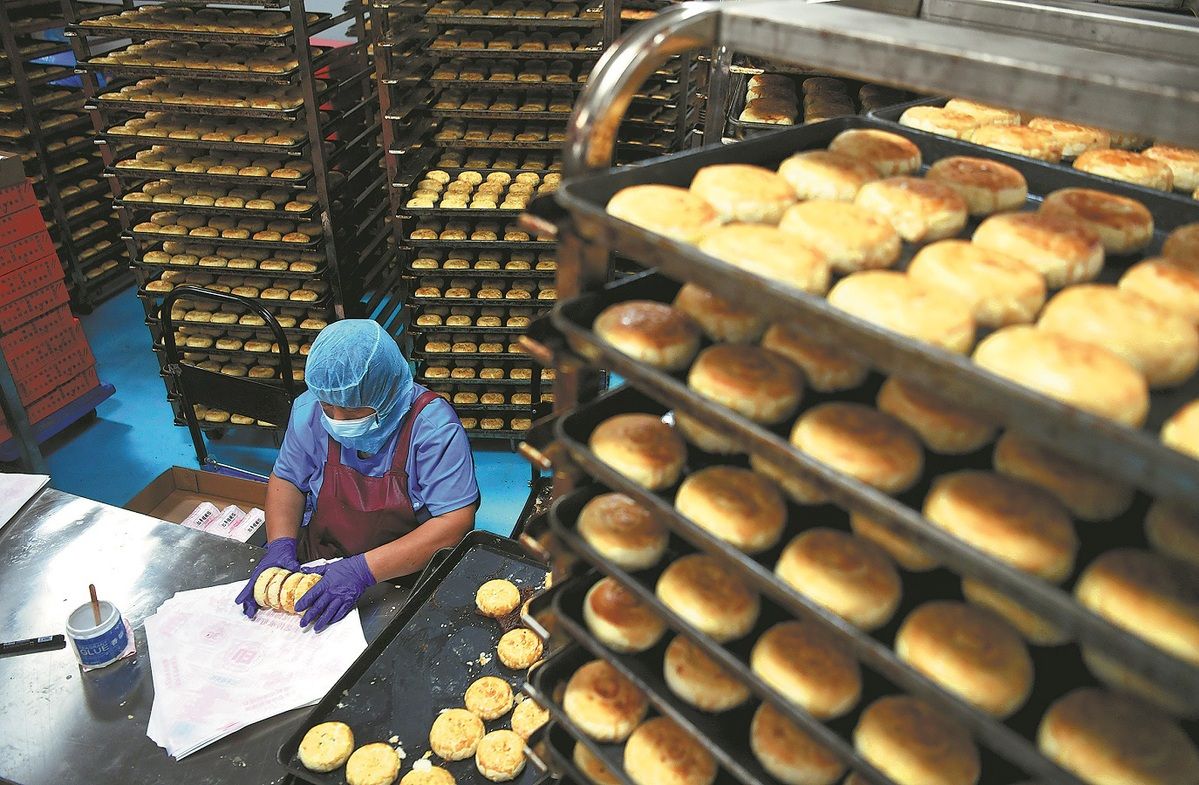
A worker makes mooncakes in a workshop of a mooncake production company in Huangzhuang village, Shijiazhuang, Hebei province, on Sept 11, 2024. ZHAI YUJIA/CHINA NEWS SERVICE
As the Mid-Autumn Festival approaches, people from outside Huangzhuang village in Hebei province have been busy lining up to buy mooncakes while locals have been working to make or sell the tasty treats.
Huangzhuang village, about 250 kilometers southwest of downtown Beijing, is famous for its mooncakes, which Chinese people traditionally eat or give as gifts to celebrate the festival.
Unsurprisingly, mooncake producers in the area typically hit their annual peak production and sales in September.
"Currently, we are basically producing 20 metric tons of mooncakes daily, priced between 24 and 36 yuan ($3.37 and $5.05) per kilogram," said Zhu Xuesha, general manager of Shijiazhuang Yin Nainai Food Co, one of the largest mooncake producers in the village.
"Our sales revenue can reach 400,000 yuan a day, and the demand usually exceeds supply."
Zhu said Yin Nainai started making mooncakes in June, but business has been especially booming since September began.
"Now, we typically sell out by around 3 pm every day," she said.
There are more than 50 mooncake manufacturers in Huangzhuang, including Zhu's company, according to Tian Yafeng, deputy Party secretary of the village.
The village, covering about 1.5 square kilometers with a population of about 10,000, has more than 1,600 residents working in the mooncake industry, he added.
During the peak sales season, producers collectively make around 60 to 80 tons of mooncakes daily, offering over 40 varieties with fillings such as mixed nuts, red bean paste, chestnuts, hawthorns and egg yolk. Daily sales can reach up to 2 million yuan, Tian said.
According to Tian, the history of mooncake production in Huangzhuang dates back to the 1930s, when a villager named Zhang Fucheng apprenticed with a baker in neighboring Zhengding county and then brought back the skill to the village.
As living standards improved in the 1980s, the villagers began paying more attention to the Mid-Autumn Festival. Zhang and a few of his apprentices started helping residents make mooncakes for the holiday.
"My grandmother began helping neighbors make mooncakes in the 1980s," said Zhu. "Back then, the neighbors would bring flour, oil and fillings, and she would make mooncakes with these materials in our small courtyard."
Around 2010, villagers started seeing the business opportunity that mooncakes presented and gradually joined the ranks of producers.
"Especially since 2019, a lot of people have joined the industry," Tian said.
They sell mooncakes not only at their shops, but also via livestreams, wholesale markets and other channels.
The reason Huangzhuang mooncakes are so popular is that local artisans are guided by professional technicians, and various enterprises compete and focus on research and development to improve quality, Tian said.
There are now many online guides giving netizens tips on buying mooncakes in Huangzhuang village, including on who makes the best ones and what time they should start lining up to buy them.
"In the past five or six years, I have come here because my family loves to eat the mooncakes," said Zhang Wei, a resident in downtown Shijiazhuang who drove about 30 minutes on Wednesday morning to buy a few boxes from a Yujiang Mooncake store, one of the most popular local brands.
"I prefer to come here in person to enjoy the great festive atmosphere," Zhang said, adding that the street she shopped on was filled with stores selling mooncakes.
According to Tian, the out-of-town customers mainly come from downtown Shijiazhuang, while others come from the neighboring cities of Cangzhou, Baoding and Handan. Meanwhile, the village's mooncakes have found online customers as far west as the Xinjiang Uygur autonomous region and as far south as Guangdong province.



